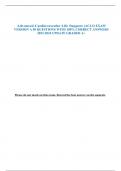acls (ACLS)
A.T. Still University
All 10 results
Sort by
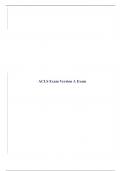
-
ACLS Exam Version A, Version B, Version C & Final Exams 2022/ 2023 Bundle
- Package deal • 6 items • 2023
-
- $28.00
- + learn more
1 Exam (elaborations) ACLS Exam Version A Exam 2 Exam (elaborations) ACLS Exam Version B Exam 3 Exam (elaborations) ACLS Exam Version C 4 Exam (elaborations) ACLS Final Exam Advanced Cardiovascular Life Support Exam 5 Exam (elaborations) ACLS Final Exam 2022 Advanced Cardiovascular Life Support Exam 6 Exam (elaborations) ACLS Final Exam 2022/
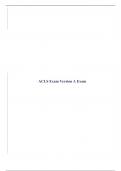
-
ACLS Exam Version A, Version B, Version C & Final Exams 2022/ 2023 Bundle
- Package deal • 6 items • 2023
-
- $28.00
- + learn more
1 Exam (elaborations) ACLS Exam Version A Exam 2 Exam (elaborations) ACLS Exam Version B Exam 3 Exam (elaborations) ACLS Exam Version C 4 Exam (elaborations) ACLS Final Exam Advanced Cardiovascular Life Support Exam 5 Exam (elaborations) ACLS Final Exam 2022 Advanced Cardiovascular Life Support Exam 6 Exam (elaborations) ACLS Final Exam 2022/
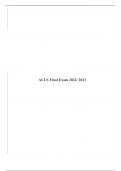
-
ACLS Exam Version A, Version B, Version C & Final Exams 2022/ 2023 Bundle
- Package deal • 6 items • 2023
-
- $25.00
- 1x sold
- + learn more
1 Exam (elaborations) ACLS Exam Version A Exam 2 Exam (elaborations) ACLS Exam Version B Exam 3 Exam (elaborations) ACLS Exam Version C 4 Exam (elaborations) ACLS Final Exam Advanced Cardiovascular Life Support Exam 5 Exam (elaborations) ACLS Final Exam 2022/ 2023 6 Exam (elaborations) ACLS Final Exam 2022 Advanced Cardiovascular Life Support
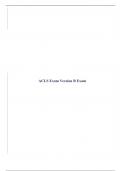
-
ACLS Exam Version B Exam
- Exam (elaborations) • 16 pages • 2023
- Available in package deal
-
- $13.00
- + learn more
Advanced Cardiovascular Life Support Exam Version B (50 questions) 1. What should be done to minimize interruptions in chest compressions during CPR? A. Perform pulse checks only after defibrillation. B. Continue CPR while the defibrillator is charging. C. Administer IV medications only when breaths are given. D. Continue to use AED even after the arrival of a manual defibrillator. 2. Which condition is an indication to stop or withhold resuscitative efforts? A. Unwitnessed arrest B. Safety thre...
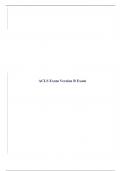
-
ACLS Exam Version B Exam
- Exam (elaborations) • 16 pages • 2023
- Available in package deal
-
- $13.00
- + learn more
Advanced Cardiovascular Life Support Exam Version B (50 questions) 1. What should be done to minimize interruptions in chest compressions during CPR? A. Perform pulse checks only after defibrillation. B. Continue CPR while the defibrillator is charging. C. Administer IV medications only when breaths are given. D. Continue to use AED even after the arrival of a manual defibrillator. 2. Which condition is an indication to stop or withhold resuscitative efforts? A. Unwitnessed arrest B. Safety thre...
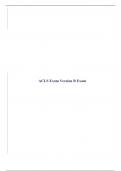
-
ACLS Exam Version B – American Heart Association (AHA) – Clinical Scenario-Based Questions with Answers (2024)
- Exam (elaborations) • 16 pages • 2023
- Available in package deal
-
- $13.00
- + learn more
This document contains a complete version of the ACLS (Advanced Cardiovascular Life Support) Exam Version B, aligned with the American Heart Association (AHA) 2024 guidelines. It includes scenario-based multiple-choice questions and answers covering core topics such as bradycardia, tachycardia, cardiac arrest, post-resuscitation care, and drug administration. Ideal for healthcare professionals preparing for ACLS certification or recertification.

-
ACLS Exam Version A – Practice Test with Correct Answers (American Heart Association, 2023)
- Exam (elaborations) • 18 pages • 2023
- Available in package deal
-
- $13.00
- + learn more
This document is a complete answer key for the ACLS (Advanced Cardiovascular Life Support) Exam Version A, typically used for certification or recertification under the American Heart Association (AHA) guidelines. It contains 50 multiple-choice questions with the correct answers clearly marked, covering key ACLS topics such as cardiac arrest, acute coronary syndromes, stroke, team dynamics, and airway management. Ideal for healthcare providers preparing for the ACLS exam.

-
ACLS Exam Version A Exam
- Exam (elaborations) • 18 pages • 2023
- Available in package deal
-
- $13.00
- + learn more
Advanced Cardiovascular Life Support Exam Version A (50 questions) 1. You find an unresponsive patient who is not breathing. After activating the emergency response system, you determine that there is no pulse. What is your next action? A. Open the airway with a head tilt–chin lift. B. Administer epinephrine at a dose of 1 mg/kg. C. Deliver 2 rescue breaths each over 1 second. D. Start chest compressions at a rate of at least 100/min. 2. You are evaluating a 58-year-old man with chest pain. Th...
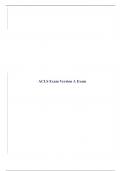
-
ACLS Exam Version A Exam
- Exam (elaborations) • 18 pages • 2023
- Available in package deal
-
- $13.00
- + learn more
Advanced Cardiovascular Life Support Exam Version A (50 questions) 1. You find an unresponsive patient who is not breathing. After activating the emergency response system, you determine that there is no pulse. What is your next action? A. Open the airway with a head tilt–chin lift. B. Administer epinephrine at a dose of 1 mg/kg. C. Deliver 2 rescue breaths each over 1 second. D. Start chest compressions at a rate of at least 100/min. 2. You are evaluating a 58-year-old man with chest pain. Th...
Advanced Cardiovascular Life Support (ACLS) Exams Version A, B & C // AHA ACLS EXAMs // ACLS EXAMS {BUNDLE COMPILATION}

$6.50 for your textbook summary multiplied by 100 fellow students... Do the math: that's a lot of money! Don't be a thief of your own wallet and start uploading yours now. Discover all about earning on Stuvia



